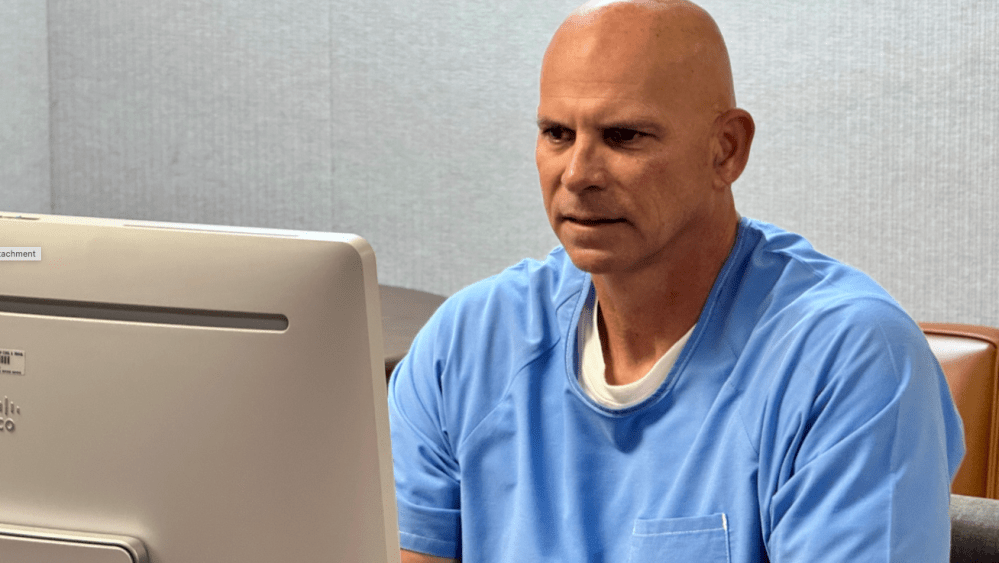The California Parole Board on Friday rejected Lyle Menendez‘ bid for release, a day after a separate panel refused to parole his brother Erik.
The brothers made their first appearances before the parole board since being convicted of the 1989 murders of their parents, Jose and Kitty. A judge in Van Nuys agreed in May to reduce their sentences to 50 years to life, making them eligible.
Both brothers will get another chance at parole in three years.
Julie Garland, one of two parole commissioners who heard the case, said that while Lyle Menendez has shown some positive signs behind bars, “You still struggle with anti-social personality traits like deception, minimization and rule breaking that lie beneath that positive surface.”
Garland urged him not to give up hope of release.
“This denial is not … it’s not the end,” she said. “It’s a way for you to spend some time to demonstrate, to practice what you preach about who you are, who you want to be.”
A Menendez family spokesperson said the family is disappointed but not discouraged, noting that a habeas corpus petition for both brothers remains pending.
“We love them unconditionally and will continue to stand by them on the journey ahead,” the family said.
Addressing the board on Friday, Lyle Menendez apologized for the crimes, saying that the decision to resort to violence was solely his and not his brother’s.
“I’m profoundly sorry for who I was, for the harm that everyone has endured,” Menendez said. “I will never be able to make up for the harm and grief I caused everyone in my family. I am so sorry to everyone, and I will be forever sorry.”
The parole board reviews inmates for “suitability,” based on whether they pose a current threat to society. Much of the hearing on Friday focused on Menendez’s illicit use of cell phones at the Richard J. Donovan Correctional Facility in San Diego.
Menendez was barred from having family visits for three years after being caught with a phone in March 2024. As an inmate, he had access to an approved prison tablet, but he said that jail staff had access to his communications and would sometimes sell them to tabloids. He said he used the illicit cell phone to stay in touch with family.
“I had convinced myself that this wasn’t a means that was harming anyone but myself in a rule violation,” he said. “I didn’t think it really disrupted prison management very much.”
A prison doctor concluded that Menendez displayed anti-social traits, including entitlement, deception, manipulation, and not accepting consequences.
Prosecutor Ethan Milius, who opposed parole, argued that the record shows that Menendez believes “the rules don’t apply to him.”
“There is no growth,” Milius said. “It is just who Lyle appears to be.”
Menendez’ parole attorney, Heidi Rummel, argued that the phone issue had been blown out of proportion, and that there was no evidence of violence or other criminality behind bars.
She also urged the panel to consider the severe effects of childhood sexual abuse in making their decision.
“This crime arose from trauma, from unresolved trauma, from fear, from sadistic abuse, and from cruelty,” she said.
Menendez’ relatives also urged the panel to release him. Their testimony was interrupted when it emerged that ABC News had obtained and broadcast audio from Thursday’s hearing with Erik Menendez. Rummel argued that the release of the audio was improper, as the relatives were unaware that audio of their testimony would become public. After a significant delay, the hearing resumed with the commissioners promising not to release audio of Friday’s hearing without further proceedings.
The Menendez case reemerged in pop culture with the release of “Monsters: The Lyle and Erik Menendez Story,” the hit Netflix series released last year. The series, along with two documentaries about the case, came out as the brothers had a pending habeas corpus motion, in which they argued that new evidence warranted a new trial.
The Los Angeles County D.A. at the time, George Gascón, was asked his position on the motion, which prompted the office to take a fresh look at the case and ultimately seek resentencing. At the time, the brothers were serving sentences of life without the possibility of parole.
Gascón was soundly defeated in the November 2024 election. His successor, Nathan Hochman, has raised strenuous objections to the brothers’ release, arguing their continued claims of “self defense” show they have not taken full responsibility for their crimes.

